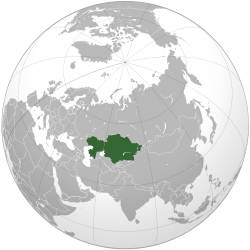Kazakhstan: Growing Crackdown On Free Speech
The Kazakh government should end its crackdown on independent media outlets and opposition groups, Human Rights Watch said today. The authorities appear to be targeting media and opposition groups that most extensively covered violence a year ago in Zhanaozen, in western Kazakhstan, and its aftermath.
On December 16, 2011, police opened fire on striking oil workers and others in Zhanaozen, killing 12 people and wounding dozens, according to government figures. In recent weeks authorities have begun a series of court cases against media outlets and opposition groups in a move to shut them down.

“Closing down independent media outlets is a blatant attempt by the government to muzzle critical voices in Kazakhstan,” said Mihra Rittmann, Central Asia researcher at Human Rights Watch. “The authorities should immediately drop their lawsuits and ensure that the right to free speech and freedom of the media are upheld.”
On November 21, 2012, Kazakhstan’s Prosecutor General’s Office announced that the Almaty city prosecutor was suing key independent media outlets and opposition groups. The suits seek to close them down on grounds that they published information that was found to incite social discord and that called for the overthrow of the constitutional order. The prosecutor contends that the media outlets and opposition groups therefore engaged in “extremist” speech and activities.
The media and opposition groups named by the Prosecutor General’s Office are newspapers Golos Respubliki and Vzglyad, as well as their affiliate newspapers and websites, the online television portals K+ and Stan.TV, the unregistered opposition group Alga!, and the People’s Front, an opposition movement.
The same day the Prosecutor General’s Office made the announcement, an Almaty court ordered Alga! to suspend its activities immediately. Other courts banned the publication and distribution of Golos Respubliki and Vzglyad, their affiliated newspapers and online content, and the broadcasting of materials produced by Stan.TV. These orders haveeffectively shut down each of the media outlets before courts have even reviewed the allegations against them.
The Prosecutor General’s Office’s announcement came after an appeals court, on November 19, upheld a guilty verdict against Vladimir Kozlov, leader of Alga!. Kozlov, 52, was sentenced on October 8 to seven-and-a-half years in prison for his alleged role in violent clashes in Zhanaozen, which followed extended labor strikes there.
The clashes between striking oil workers, other people, and the police took place on Kazakhstan’s Independence Day on Zhanaozen’s central square. Police and government troops opened fire in response to the clashes and subsequent mayhem. In addition to the 12 killed and others wounded by gunfire, three other people died and 35 police officers were injured.
Hearings against various media outlets and Alga! started on November 27 and are ongoing. In each lawsuit, the Almaty city prosecutor has cited state-ordered, linguistic expert “analysis” of materials produced by the media outlets and opposition groups, which also served as evidence in the case against Kozlov. The analysis concludes that materials contained “features of inciting social discord and propagandizing violent overthrow of the government.”
Under Kazakh national legislation, inciting social discord and calling for the violent overthrow of the government are types of “extremism.” The lawsuits also invoke Kozlov’s conviction, in which the court held that the “conceptual content” of materials produced by these media outlets was “aimed at inciting social discord.”
In its suit against Alga!, the city prosecutor sought to ban the opposition group as “extremist.”
“The Kazakh government is clearly intensifying its year-long clampdown on free speech under the umbrella of the vague and overreaching charge of ‘inciting social discord’ and the pretext of state security,” Rittmann said. “Unashamedly ignoring their human rights obligations, the authorities are invoking allegations of ‘extremism’ to justify silencing legitimate, critical voices.”
On December 4, an Almaty court banned production and broadcasting of Stan.TV materials in Kazakhstan. A local media watchdog, Adilsoz, reported that on December 6, another Almaty court prohibited the broadcast in Kazakhstan of any material produced by K+ or its affiliates.
Motions by the media outlets and Alga! to dismiss the lawsuits have been rejected, representatives of these groups told Human Rights Watch. The hearings have also failed to comply with Kazakh procedural law, they said.
On December 12, the Almaty City Specialized Inter-district Administrative Court fined Tatyana Trubacheva, Golos Respubliki editor-in-chief, approximately US$100 for violating the November 21 order to suspend the production and distribution of the newspaper and its affiliate materials. On November 30, court bailiffs seized copies of Ne-Vzglyad, although this newspaper is not on the list of publications subject to immediate suspension.
